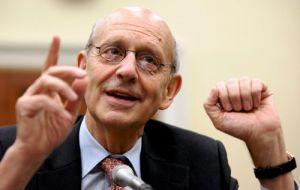MercoPress. South Atlantic News Agency
US Supreme Court inclined to limit disclosure of Argentine non-US assets
 Chief Justice Roberts Jr. said that request went too far, “how many jet fighters Argentina happens to have”
Chief Justice Roberts Jr. said that request went too far, “how many jet fighters Argentina happens to have”  Edwin S. Kneedler, Deputy solicitor general, argued in support of Argentina saying “the United States would be gravely concerned”
Edwin S. Kneedler, Deputy solicitor general, argued in support of Argentina saying “the United States would be gravely concerned”  Justice Breyer playfully cited “marvellous Argentine beef” in a butcher's shop in Italy as an example of the type of commercial property to pursue
Justice Breyer playfully cited “marvellous Argentine beef” in a butcher's shop in Italy as an example of the type of commercial property to pursue  Justice Scalia said not a single foreign country stood up, “maybe because Argentina owes them money as well as it does these plaintiffs”
Justice Scalia said not a single foreign country stood up, “maybe because Argentina owes them money as well as it does these plaintiffs” US Supreme Court justices seemed to indicate on Monday that creditors should be able to seek limited information about Argentina's non-US assets in a case stemming from long-running litigation over Argentina's obligations to hedge bond investors. The US administration of President Barack Obama sided with Argentina based on the foreign sovereignty immunity act.
During the one-hour oral argument concerning hedge fund NML Capital Ltd's efforts to seek payment of court judgments it says are worth around 1.7 billion dollars, several justices suggested that military and diplomatic assets should be off-limits, which would narrow the scope of the ruling.
The issue before the justices was in some ways a minor one, and they will soon decide whether to hear a second and more significant case arising from Argentina’s 2001/02 default on billions of dollars of debt. That case is an appeal by Argentina of a lower court’s decision in favor of hedge funds that held about 1.3 billion in Argentine bonds.
The question for the justices at Monday's argument was whether federal courts in the United States may issue subpoenas to banks to help creditors who have won judgments against Argentina find assets around the world. That is whether NML, a unit of billionaire hedge fund manager Paul Singer's Elliott Management Corp, could enforce subpoenas against Bank of America and Banco de la Nacion Argentina.
Several justices seemed prepared to allow subpoenas for some information, though some of them suggested the creditors’ requests had been too sweeping.
Theodore B. Olson, a lawyer for the bondholders in both cases, said they were entitled to detailed information because Argentina had been disguising and hiding its assets. “If it’s an airline that says Argentine Air Force on the side of it,” he said, “it still could be commercial property. We need to know what those assets are.”
Chief Justice John G. Roberts Jr. said that request went too far. “Doesn’t that seem pretty extraordinary?” he asked, adding: “That’s pretty intrusive at a sovereign level to say you can find out how many jet fighters Argentina happens to have.”
Jonathan I. Blackman, a lawyer for Argentina, said the information sought would also intrude on other matters protected by foreign sovereign immunity, as outlined in a federal law called the Foreign Sovereign Immunities Act.
“The sweeping worldwide forensic examination of foreign state property that the court of appeals approved,” he said, would reveal information about “diplomatic and military property, national security assets, property of the states, current and former presidents, and other property outside the United States.”
Several justices noted that obtaining information about assets abroad was no guarantee that foreign courts would enforce the judgment the bondholders had obtained in US courts. Justice Anthony Kennedy, the nine-justice court's regular swing vote, also seemed eager to set limits.
Edwin S. Kneedler, a deputy solicitor general, argued in support of Argentina. “The United States would be gravely concerned,” he said, “about an order of a trial court in a foreign country, entered at the behest of a private person, seeking to establish a clearinghouse in that country of all the United States’ assets.”
Justice Antonin Scalia responded that the United States seemed alone in voicing concern. He said no other country had filed a brief supporting Argentina in the case, Republic of Argentina v. NML Capital, No 12-842.
“They file all the time when there is a case before us that they think trenches upon their prerogatives,” he said. “Not a single foreign country, maybe because Argentina owes them money as well as it does these plaintiffs.”
Justice Stephen Breyer playfully cited “marvellous Argentine beef” in a butcher's shop in Italy as an example of the type of commercial property that NML could pursue.
Justice Ruth Bader Ginsburg seemed more sympathetic to Argentina's position. She made reference to creditors who had held about 93% of Argentina's bonds and agreed to the 2005 and 2010 debt swaps, accepting between 25 cents and 29 cents on the dollar.
Depending on how a ruling along those lines is written, it could make it harder for NML to enforce the court judgments it has won. In effect the Argentine government has few commercial assets around the world. A ruling is due by the end of June.
Argentina defaulted on its debt in 2002 and has been in a legal battle with bondholders led by hedge funds NML and Aurelius Capital Management, which rejected two debt restructuring offers (2005 and 2010). Argentina argues the investors, which it describes as 'vulture funds' bought most of the debt at a deep discount after the default and sought to thwart the country's efforts to restructure.




Top Comments
Disclaimer & comment rules-

-

-

Read all commentsAh ha. Good plan. Ask for more than you hope for, get what you want. As a matter of interest, where IS argieland getting the money to buy jet fighters? Still, as long as information is provided to enable at least US$1.7 billion can be recovered, that's a start. And when Kirchner & co have gone, perhaps the next argie “government” will have more sense. Wonder how much the argies have paid to try to avoid coughing up? And, don't forget debt-swap bondholders, a contract under duress is not a contract!
Apr 22nd, 2014 - 12:06 pm 0For so long I've been telling the Rg they will lose at SCOTUS. Everyone one of the dimwits that argued with me said terrible things about me and the US court system.
Apr 22nd, 2014 - 12:07 pm 0They are so blinded by narcissism, propaganda and they only know the screwed up way their country works so they think every other country is a messed up as Argentina.
This is why they are always humiliated on the world stage.
When will they ever learn?
It seems the deputy solicitor general and Chief Justice Roberts have a sound understanding of the situation.
Apr 22nd, 2014 - 12:09 pm 0“The United States would be gravely concerned, about an order of a trial court in a foreign country, entered at the behest of a private person, seeking to establish a clearing house in that country of all the United States’ assets.”
That is the logic that should prevail and I think will.
Limited disclosure of RG assets isn't going to help the creditors much anyway, so NML are either going to lose this case, or get a ruling that helps them none.
Commenting for this story is now closed.
If you have a Facebook account, become a fan and comment on our Facebook Page!